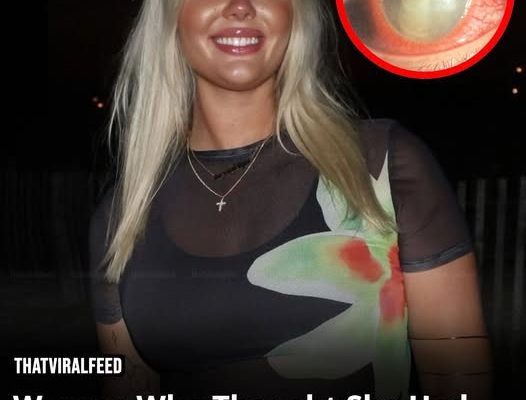A young woman went blind in one eye after initially thinking she had a bit of sand or something minor stuck in it.
What she found out was far more serious than she ever imagined.
Brooklyn McCasland described being in “constant pain” following a beach trip in Alabama, where she believed that a little debris had just gotten caught in her lashes.
Unfortunately, this was only the beginning of her ordeal.
Brooklyn has had to leave her job as a barista and now spends her days keeping her eye shut, trying to relieve some of the pain.
After multiple visits and consultations, doctors determined that she had contracted acanthamoeba keratitis, a condition as unsettling as it sounds.

What is Acanthamoeba Keratitis (AK)?
Acanthamoeba keratitis is a rare infection that can pose serious threats to vision. It’s caused by a microscopic organism known as acanthamoeba.
This parasitic organism can enter the eye and start to eat away at tissue. It’s typically found in non-distilled or non-boiled water sources, such as lakes and even tap water.
The infection often happens when a contact lens comes into contact with contaminated water.

Early symptoms often feel like itching in the eye, but they can quickly progress to severe pain, redness, and blurred vision.
“It felt like glass in your eye”
Brooklyn initially brushed off her discomfort as just a bit of sand in her eye, but soon found herself dealing with some of the worst pain she’s ever felt.
“I thought I had something in my eye, just a piece of sand or something,” Brooklyn said.
“That’s when I went to my eye doctor. It kind of felt like glass was in your eye. It was just constant pain.”
She believes the parasite got into her eye while she was enjoying her time at the beach with her contacts in, an activity that is widely cautioned against by eye care professionals, although Brooklyn wasn’t aware of this danger.
She said: “I started wearing [contact lenses] when I was seven. I wore them everywhere: to the pool, showered in my contacts and swam in my contacts.”

“I even washed my contact case with tap water to clean it out. Now I know you’re not supposed to do it, but I’ve done that for forever.”
Doctors told her it was a ‘common infection’
After her symptoms started, Brooklyn went to her optician, who initially thought it was just “a common infection” and gave her antibiotic drops to treat it.
But the drops didn’t help at all, and Brooklyn felt her symptoms worsening. She ended up having to take a full month off work because the pain was becoming unbearable.
“I came back for one of my appointments and I was in really, really bad pain and she [the optician] said I had an abrasion on my eye,” she explained.
She shared: “I’m pretty much permanently blind in my right eye now. It was very scary.”
“My depth perception – when I pick up things or try to open doors – is off, so that’s been hard to get used to.”

“It was a relief to have everything answered”
Brooklyn had to endure weeks of severe pain and frustration before finally being diagnosed with AK after a referral to a cornea specialist four hours away.
Finally, she felt some relief knowing the source of her symptoms after a challenging few weeks.
She underwent several scans so the specialist could understand what was causing her so much pain.
“I got a phone call and they said they’d got my results back,” Brooklyn said. “He said that I did have AK.”
Brooklyn now awaits a cornea transplant, costing about $5,000, to hopefully regain her sight after her infection heals.
Alongside that, she’s also been prescribed medications totaling $62,000, which she hopes her insurance will cover.
Her friend, Jordan Yoder, has started a GoFundMe page to help raise $10,000 to support Brooklyn’s treatment and cover her expenses while she’s unable to work.
Only after that period can doctors assess her for a cornea transplant.
“Not being able to see is really, really hard”
Brooklyn is hopeful for a brighter future and has her fingers crossed that one day she’ll regain sight in her right eye.
“It can take a year for the cornea transplant to heal, so I’ve still got a pretty long road of recovery,” she expressed.
“In my situation I have to keep my eye shut all day and I can’t work at all.”

“Not being able to see is really, really hard,” Brooklyn said. “I definitely took it for granted. Just day-to-day doing stuff. Now I don’t have eyesight, I’d do anything to get it back. It’d be life-changing, for sure.”
Brooklyn wants others to hear her story, hoping to spread awareness and encourage people to stay cautious, as “anybody can get it.”
“I think that’s something that people don’t really realise that yes, some people get away with it but I’m someone who has worn contacts since I was seven years old and have never thought that I could get something like this and then it happened to me.”
“Just because it’s a rare condition, it doesn’t mean it can’t happen to you.”



